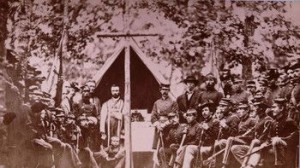 Southern Baptist leaders have long wrung their hands over the seeming neglect of Sabbath observance within the Confederate Army. Their concerns represent a crossing of a Rubicon in matters of church and state: whereas historically Baptists have opposed government establishing holy day laws, many Southern Baptists insist that Confederate officials mandate that soldiers observe Sunday as a holy day.
Southern Baptist leaders have long wrung their hands over the seeming neglect of Sabbath observance within the Confederate Army. Their concerns represent a crossing of a Rubicon in matters of church and state: whereas historically Baptists have opposed government establishing holy day laws, many Southern Baptists insist that Confederate officials mandate that soldiers observe Sunday as a holy day.
Baptists’ change of heart and tradition lies in the belief that the Confederacy is God’s chosen nation, ordained on high to preserve white supremacy and African slavery, convictions oft noted in Baptist newspapers of the South during the war–other than in the South Carolina Confederate Baptist, a periodical that consistently implores Baptists to maintain their tradition of church state separation and thus avoid petitions to the state for the purpose of granting privileges to Christians or enshrining Christianity in law.
Apart from outliers such as the editors of the Confederate Baptist, however, many Baptists of the South, through church and association resolutions as well as newspapers, have long petitioned, along with other Christians, the Confederate government to prohibit military activities on Sundays.
Today, Confederate Gen. Robert E. Lee himself responds to such requests by issuing Order No. 50:
I. The attention of the army has already been called to the obligation of a proper observance of the Sabbath, but a sense of its importance, not only as a moral and religious duty, but as contributing to the personal health and well-being of the troops, induces the commanding general [Robert E. Lee] to repeat the orders on that subject. He has learned with great pleasure that in many brigades convenient houses of worship have been erected, and earnestly desires that every facility consistent with the requirements of discipline shall be afforded the men to assemble themselves together for the purpose of devotion.
II. To this end he directs that none but duties strictly necessary shall be required to be performed on Sunday, and that all labor, both of men and animals, which it is practicable to anticipate or postpone, or the immediate performance of which is not essential to the safety, health, or comfort of the army, shall be suspended on that day.
III. Commanding officers will require the usual inspections on Sunday to be held at such time as not to interfere with the attendance of the men on divine service at the customary hour in the morning. They also will give their attention to the maintenance of order and quiet around the places of worship, and prohibit anything that may tend to disturb or interrupt religious exercises.
Much is the rejoicing that follows as news of Lee’s order spreads throughout the South. Surely, the God of the South is pleased. Perhaps in turn He will grant future victories to his army, many white Southern Baptists hope.
Sources: U.S. War Department, The War of the Rebellion: A Compilation of the Official Record of the Union and Confederate Armies, serial. I, vol. 33 (Washington, D.C.: Government Printing Office, 1880-1901), 1150; see also William W. Bennett, A narrative of the great revival which prevailed in the Southern armies, Philadelphia: Claxton, Remsen, & Haffelfinger, 1877, p. 17 (link) and Michael L. Bineham, “Role of the Southern Baptist Chaplains and Missionaries in the Civil War,” thesis, U.S. Army Command and General Staff College, Fort Leavenworth, Kan.: 2003 (link); for more information on Baptists and church state issues during the war see Bruce T. Gourley, Diverging Loyalties: Baptists in Middle Georgia During the Civil War, Macon, Ga.: Mercer University Press, 2011 (link)


